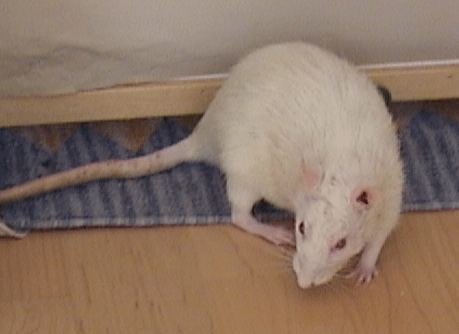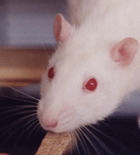27th May 2009
Peanuts in Your Pet’s Foods or Treats? Beware of Food Allergies!
 In humans, peanut allergy is the most common food-related cause of lethal anaphylaxis. Unlike many other food allergies, it often persists into adulthood. As well, peanuts are often used in dog treats. Well, you may say, peanuts can be allergens for humans, but can animals be allergic to them too? Yes, they can; read on…
In humans, peanut allergy is the most common food-related cause of lethal anaphylaxis. Unlike many other food allergies, it often persists into adulthood. As well, peanuts are often used in dog treats. Well, you may say, peanuts can be allergens for humans, but can animals be allergic to them too? Yes, they can; read on…
When pre-sensitized mice were injected with peanut extract, it was found that this caused dose-dependent shock by induction of complement C3a. The resulting shock was found to be independent of LPS (bacterial) contamination. C3a stimulates macrophages, basophils, and mast cells to produce platelet-activating factor and histamine (1). Another study found that peanut extract caused gene expression changes in the mesenteric lymph nodes of Brown Norway rats (2).
Many pet treats contain peanut butter because animals simply love the taste! However, be aware of this food’s allergenic potential. Mice aren’t the only animals that can be allergic to peanuts. At least one study (3) has shown that dogs can also be allergic to peanuts and other common human allergens. The allergenic response in dogs follows this hierarchy: peanut > tree nuts > wheat > soy > barley.
The probiotic Lactobacillus casei Shirota could not down-regulate the allergic response to peanuts in Brown Norway rats (4).
At Onesta Organics, we promise to resist the temptation to use peanuts, which are tasty, but potentially harmful, simply to increase palatibility of our pet food products.
1. Khodoun et al. J Allergy Clin Immunol 2009;123(2):352-3
2. deJonge et al. J Immunotoxicol 2008:5(4):385-94
3. Teuber et al. J Allergy Clin Immunol 2002;110(6):921-7
4. deJonge et al. Toxicology 2008;249(2-3):140-5
 In humans, peanut allergy is the most common food-related cause of lethal anaphylaxis. Unlike many other food allergies, it often persists into adulthood. As well, peanuts are often used in dog treats. Well, you may say, peanuts can be allergens for humans, but can animals be allergic to them too? Yes, they can; read on…
In humans, peanut allergy is the most common food-related cause of lethal anaphylaxis. Unlike many other food allergies, it often persists into adulthood. As well, peanuts are often used in dog treats. Well, you may say, peanuts can be allergens for humans, but can animals be allergic to them too? Yes, they can; read on…
When pre-sensitized mice were injected with peanut extract, it was found that this caused dose-dependent shock by induction of complement C3a. The resulting shock was found to be independent of LPS (bacterial) contamination. C3a stimulates macrophages, basophils, and mast cells to produce platelet-activating factor and histamine (1). Another study found that peanut extract caused gene expression changes in the mesenteric lymph nodes of Brown Norway rats (2).
Many pet treats contain peanut butter because animals simply love the taste! However, be aware of this food’s allergenic potential. Mice aren’t the only animals that can be allergic to peanuts. At least one study (3) has shown that dogs can also be allergic to peanuts and other common human allergens. The allergenic response in dogs follows this hierarchy: peanut > tree nuts > wheat > soy > barley.
The probiotic Lactobacillus casei Shirota could not down-regulate the allergic response to peanuts in Brown Norway rats (4).
At Onesta Organics, we promise to resist the temptation to use peanuts, which are tasty, but potentially harmful, simply to increase palatibility of our pet food products.
1. Khodoun et al. J Allergy Clin Immunol 2009;123(2):352-3
2. deJonge et al. J Immunotoxicol 2008:5(4):385-94
3. Teuber et al. J Allergy Clin Immunol 2002;110(6):921-7
4. deJonge et al. Toxicology 2008;249(2-3):140-5
 Posted by Heidi Junger, PhD under
Posted by Heidi Junger, PhD under  Home Remedies & News Bits
Home Remedies & News Bits  Comments Off
Comments Off


 One cigarette contains 15 to 25 mg of nicotine, a cigar 15-40mg, a cigarette patch between 8-114mg. A cigarette butt contains 4-8 mg of nicotine, depending on its length and content in the original cigarette. Since smoking concentrates nicotine, cigarette butts contain relatively higher amounts of nicotine. Chewing tobacco contains between 6 and 8 mg of nicotine.
One cigarette contains 15 to 25 mg of nicotine, a cigar 15-40mg, a cigarette patch between 8-114mg. A cigarette butt contains 4-8 mg of nicotine, depending on its length and content in the original cigarette. Since smoking concentrates nicotine, cigarette butts contain relatively higher amounts of nicotine. Chewing tobacco contains between 6 and 8 mg of nicotine. Some animals do not show symptoms for hours after exposure to toxins. Therefore, it is best to bring your pet to a veterinarian if you saw or suspect that your pet ingested nicotine or was exposed to any other drug, even if you do not yet notice any symptoms. Always collect and bring along to your veterinarian all packaging or containers involved, as well as any material your pet may have chewed on or vomited. This additional information can be essential for the most effective treatment.
Some animals do not show symptoms for hours after exposure to toxins. Therefore, it is best to bring your pet to a veterinarian if you saw or suspect that your pet ingested nicotine or was exposed to any other drug, even if you do not yet notice any symptoms. Always collect and bring along to your veterinarian all packaging or containers involved, as well as any material your pet may have chewed on or vomited. This additional information can be essential for the most effective treatment. - Take the animal and hold her gently in a comfortable position with one hand.
- Take the animal and hold her gently in a comfortable position with one hand. Ozone is a natural gas with short reactive half life time but great therapeutic and sanitary properties.
Ozone is a natural gas with short reactive half life time but great therapeutic and sanitary properties. Congestive heart failure (CHF) is a disease in which a weakened heart muscle is unable to effciently pump blood through the body. CHF can be caused by hypertension, cardiomyopathy, diabetes, coronary artery disease, heart attacks, or defective heart valves. CHF is common in some breeds of dogs or older pocket pets such as pet rats and is often treated with conventional medicine. However, CoQ10 and L-carnitine and other supplementation may support conventional treatment regimen or can be used for prevention purposes.
Congestive heart failure (CHF) is a disease in which a weakened heart muscle is unable to effciently pump blood through the body. CHF can be caused by hypertension, cardiomyopathy, diabetes, coronary artery disease, heart attacks, or defective heart valves. CHF is common in some breeds of dogs or older pocket pets such as pet rats and is often treated with conventional medicine. However, CoQ10 and L-carnitine and other supplementation may support conventional treatment regimen or can be used for prevention purposes.